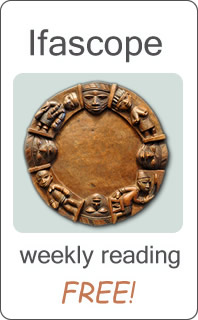To pay a bribe or not
It was mid-morning of an early Fall afternoon in Chicago when I received a call from a client we shall cal "Harold." Harold was calling from a far Western Suburb, and from the sound of his voice he was quite concerned about something. While this might seem axiomatic for anyone consulting a Babalawo, it was a little strange from this particular client.
Harold, you see, was a "tough guy," in both the literal and figurative sense. While now a respectable business owner of several taverns, his background was, to say the least, somewhat sordid.
At any rate, I asked if he would like to make an appointment for later in the week. "No," he said, "it couldn't wait, " and he wanted to take the 90 minute drive into the city right away. Partially out of curiosity, and partially from a somewhat anachronistic concept of obligation, I agreed to wait until he arrived.
Less than 90 minutes later, which indicated that Harold had disregarded the speed limits in much the same way he had disregarded a number of laws, arrived.
"What's the urgency," I asked as he sat down. " Well, it's like this," he began, " a few years back when I was still involved, a couple of us did a job in a jewelry store. Nothing ever happened. Then, yesterday, I get a call from a lawyer who's handling a case for the guy who was involved in the jewelry store thing. It turns out he's been taken down for something, and he's looking to make a deal with the Government. One of the things he can offer them is the information about the Jewelry thing. His lawyer says he doesn't want to do it, but unless he gets 30 G to pay his attorney bills, he says he has no choice."
Having left his "fast lane" former life, having recently remarried, had another child, and several thriving Taverns, I could clearly see why the threat of potentially going to jail, or at least to trial, had propelled his rapid drive to my office.
It's worth pausing here for just a moment to reflect on the Babalawo's view of, and responsibility to, morality and justice. While I can't speak for every Babalawo, I do know that my own view is actually quite judgmental. As Good Character is the cornerstone of effective use of Ifa, I do not believe it is my position to enable people to behave with bad character and get away with it. On the other hand, this is balanced by an overwhelming reality, without which, I could not practice. That is: "People are capable of change." After all, if we can change the probability of events, we can also help individuals change the probabilities of their behavior and character. So, with a few exceptions, if I feel the individual is not likely to replicate their bad behavior, I will use Ifa's ability to manipulate energy to help them. Harold's case was an example of this. Harold was leading a better life. Was very much in love with his new wife and baby, and very much loved his older daughter from his first marriage.indeed, that became critical later on...but, I don't want to get ahead of the story..So, finding the best way to protect him seemed reasonable and necessary.
The divination for Harold was quite clear, it showed him off-path, in an unsettled energy matrix, with a sub-set of relationships. This was quite early in my career, so the mistake I made was, in retrospect, understandable. What I did, was immediately divine if he was in any danger from this individual, if he should pay the thirty thousand dollars, if there would be repercussions if he did, etc. And, I got the one thing you don't ever want to get in Divination.I got contradictory answers!
Divination, is both Art and Science. The Artistry comes from the intuitive, experiential wisdom of the Diviner as reflected in the paths he takes and the specific questions he asks. The Science lies in the precise manner in which questions are answered and in the structure that demands absolute consistency in those answers. Suddenly, with Harold, I was doing badly on both counts.
Looking back, I have to smile. After about 10 minutes of casting and casting, trying desperately, but unsuccessfully, to eliminate the contradictions, I finally GOT IT! Picking up the opele, I took an entirely new tact. " Is the relationship issue about the man demanding the $30,000?," I asked. "No," was the answer. I had spent all that time trying to impose my views on the Opele/Orunmila/meta intellect of the universe. I had immediately assumed that, because of the situation Harold had described, that the extortion from his former partner in crime was the relationship issue throwing Harold off path. In a Western sense, it made sense.
Quickly I cast to see if it was a family issue. It was. "Was it his wife?" " No." "His baby?" " No." "His older daughter?" Bingo!
"Harold," I asked, "what's going on with you and your older daughter?"
The story that unfolded may not seem nearly as exciting as the $30,000 issue.but to Harold it was actually much more important. It turned out that his older daughter ( who lived with Harold's ex-wife) was about to go away to college the next year and had picked out one of the most expensive schools on the East Coast. Harold had informed her mother that he was not willing to pay that amount of money, and couldn't she select something a little less pricey? The ex-wife, who had never forgiven Harold for the divorce, used this to create a rift between Harold and the girl. Now, she wouldn't even answer the phone to speak with her dad.
This genuine tough guy, who had once been indicted for pummeling a man in one of his bars, and then hanging him up on the coat rack, was simply being torn apart by his daughters attitude.
I then asked two simple questions with the opele. 1. What orisa and ebbo would be necessary to restore relationships with the girl? 2. Should he pay the $30,000 to the man's lawyer?
Restoring relationships with his daughter required offering a watermelon to Yemonja. The answer to the second question was 'yes."
So, Harold drove back to the Western suburbs, made his offering to Yemonja, and two days later called me - delighted - to say that his Daughter had called, all was well between them.and, oh yes, he was going to send her to the school of her choice.
Harold also paid the $30,000 to the lawyer. And that was the last he heard of the problem.
In divination, and in life, it can be dangerous to focus on the obvious.
Blessings,
Oluwo Philip Neimark




